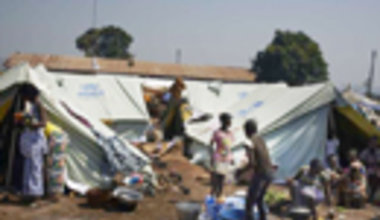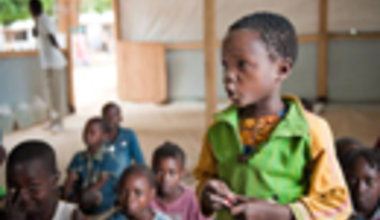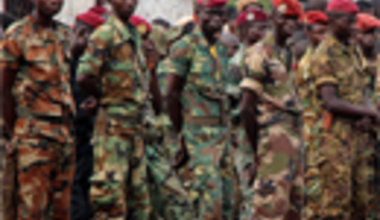Over 600 people killed, 159,000 displaced in Central African Republic – UN
13 December 2013 – The humanitarian situation in the conflict-wracked Central African Republic (CAR) is deteriorating, with 450 people killed in the capital Bangui and 159,000 others driven from their homes in Bangui, in the last week alone, United Nations agencies reported today, as the largest airlift of emergency supplies since the violence erupted arrived in the capital.
“Much more is going to be needed. We appeal once again to all parties to let humanitarian help through, and to protect civilians,” UN High Commissioner for Refugees (UNHCR) spokesperson Adrian Edwards told a news briefing in Geneva in an update on the impoverished country of 4.6 million, which has been thrown into turmoil since Séléka rebels launched attacks a year ago.
“There are frequent reports of indiscriminate attacks against civilians, recruitment of child soldiers, sexual and gender-based violence, looting and destruction of property,” he said, adding that 160 people were also reported to have been killed in other parts of CAR.
After the Séléka coalition forced President François Bozizé to flee in March, a transitional government was entrusted with restoring peace and paving the way for democratic elections, but armed clashes have erupted again, sometimes on religious grounds with Christians and Muslims launching reprisal attacks against each other in numerous places in Bangui.
“Serious human rights violations are being committed on religious grounds, as well as the looting and destruction of property,” UN High Commissioner for Human Rights (OHCHR) spokesperson Ravina Shamdasani told the briefing. “One mosque was reported to have been burnt and another one destroyed in Bangui earlier this week.”
The situation is also tense in several towns, including Bouca, Bossangoa and Bozoum, where a vicious cycle of attacks and reprisals continues, with 27 Muslims reported to have been killed by self-defence militias, known as anti-Balaka, in the village of Bohong yesterday. “We condemn any attack on places of worship and on religious freedom, and urge all communities to exercise restraint,” Ms. Shamdasani said.
Mr Edwards said 38,000 people were massed at Bangui airport without latrines, washing facilities and shelter from the rains or sun, while 12,000 others have sought shelter at St. Joseph Mukassa church, with just one water point.
“Local youth have dug latrines and UNHCR has provided plastic sheeting to allow some level of privacy and spaces where people can wash,” he added. “However, people there urgently need food, shelter, soap and other basic aid. Among them are 460 people needing medical attention. This includes 101 pregnant women. There have been three births so far.”
At the airport, UNHCR has provided tents to implementing partner MSF, which is running a medical clinic, sent aid to other relief agencies, and is working with other UN agencies and non-governmental organizations (NGOs) to scale up humanitarian operations across CAR.
So far help has reached relatively small numbers – 3,500 families so far in Bangui and another 3,000 helped in Bossangoa.
The number of refugees fleeing to neighbouring countries over the past week is rising, with 1,800 arriving in the Democratic Republic of the Congo (DRC), some after walking 200 kilometres over several days through forest with their children. There are now some 47,000 CAR refugees in DRC.
Republic of the Congo, which since March has received 10,500 CAR nationals, is also registering new arrivals. In all, the crisis has driven more than 70,000 CAR refugees into surrounding countries.
Meanwhile, the largest humanitarian cargo flight arrived in Bangui today carrying 77 metric tons of UNICEF emergency supplies.
The MD-11 charter flight is filled with blankets, soap, jerry cans, medicine, water purification supplies and plastic sheeting health and midwifery kits, for immediate distribution to up to 37,500 people.
“Over the past week, many people, mostly women and their children, have fled for their lives with nothing but the clothes they are wearing,” said Manuel Fontaine, UNICEF Regional Director for West and Central Africa, from Bangui. “At the airport, families with small children are living under the wings of airplanes, exposed to wind and rain. Many have witnessed terrible violence and are too afraid to return home.”
Source: UN News Centre
 UN
UN





